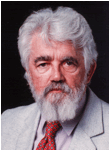John McCarthy
Born September 4, 1927, Boston, Mass.; one of the fathers of artificial intelligence and creator of the programming language LISP.

Education: BS, mathematics, California Institute of Technology, 1948; PhD, mathematics, Princeton University, 1951.
Professional Experience: Princeton University: Procter Fellow, 1950-1951, Higgins Research Instructor, 1951-1953; Stanford University: acting assistant professor, mathematics, 1953-1955, professor, computer science, 1962-present, director, Stanford Artificial Intelligence Laboratory (SAIL), 1965-1980, Charles M. Pigott Professor of Computer Science, 1987-present; assistant professor, Dartmouth College, 1955-1958; MIT: assistant professor, communications science, 1958-1961, associate professor, communications science, 1961-1962; Bobby R. Inman Professor of Computer Science, University of Texas, Fall 1987; fellow, ACM, 1994.
Honors and Awards: member, American Academy of Arts and Sciences; ACM Turing Award, 1971; president, American Association for Artificial Intelligence (AAAI), 1983-1984; First Research Excellence Award, International joint Conference on Artificial Intelligence, 1985; IEEE Computer Society Pioneer Award, 1985; member, National Academy of Engineering, 1987; Kyoto Prize, Inamori Foundation, 1988; member, National Academy of Sciences, 1989; National Medal of Science, 1990; fellow, American Association for Artificial Intelligence (AAAI), 1990; member, American Academy of Arts and Sciences.
At Princeton University, John McCarthy was a Proctor Fellow and later Higgins Research Instructor in mathematics. He was associated with the faculty of Dartmouth College and MIT, and more recently has been Charles M. Pigott Professor of Computer Science at Stanford University.
McCarthy has been interested in artificial intelligence since 1949, and coined the term in 1955 in connection with a proposed summer workshop at Dartmouth College. His main artificial intelligence research area has been the formalization of common sense knowledge. He invented the programming language LISP in 1958, developed the concept of time-sharing in the late 1950s and early 1960s, and has worked on proving that computer programs meet their specifications since the early 1960s. Since 1978, his most recent theoretical development is the circumscription method of non-monotonic reasoning.
He was chosen as the 1971 ACM Turing Award recipient and awarded the 1988 Kyoto Prize for outstanding accomplishments in advanced technology. He has proposed the design of a new language entitled "Elephant 2000" which will never forget any event in its history, and which would probably not be implemented before the year 2000. Most recently he has been working on formalization in context.
QUOTATIONS
"There's no reason we can't build machines that think." (National Geographic, 1982)
"We should try to make AI systems as good as children." (Network posting, July 16, 1987)
Discussing the absence of parentheses in his proposed language "Elephant 2000": "Having invented the language LISP, I decided that I had used up my fair share of parentheses." (Keynote speech, ACM Computer Science Conference, San Antonio, Texas, March 1991)
BIBLIOGRAPHY
Biographical
McCarthy, John, "History of LISP," in Wexelblat, Richard L., ed., History of Programming Languages, Academic Press, New York, 198 1, Chapter 4.
Significant Publications
McCarthy, John, "A Time-Sharing Operator Program for Our Projected IBM 709," unpublished memorandum, MIT, Cambridge, Mass., reprinted in Ann. Hist. Comp., Vol. 14, No. 1, 1992, pp. 20-21.
McCarthy, John, Paul Abrahams, Daniel Edwards, Timothy Hart, and Michael Levin, LISP 1.5 Programmer's Manual, MIT Press, Cambridge, Mass., 1962.
McCarthy, John, S. Boilen, E. Fredkin, and J.C.R. Licklider, "A Time-Sharing Debugging System for a Small Computer," Proc. Spring Joint Computer Conf, Vol. 23, Spartan Books, Washington, D.C., 1963, pp. 51-57.
McCarthy, John, "A Basis for a Mathematical Theory of Computation," in Braffort, P., and D. Hischberg, eds., Computer Programming and Formal Systems, North-Holland, Amsterdam, 1963, pp. 33-70.
McCarthy, John, "Programs with Common Sense," in Minsky, M., ed., Semantic Information Processing, MIT Press, Cambridge, Mass., 1968.
McCarthy, John, and PJ. Hayes, "Some Philosophical Problems from the Standpoint of Artificial Intelligence," in Michie, D., ed., Machine Intelligence 4, American Elsevier, New York, 1969.
McCarthy, John, "Ascribing Mental Qualities to Machines," in Ringle, Martin, ed., Philosophical Perspectives in Artificial Intelligence, Harvester Press, July 1979.
McCarthy, John, "Applications of Circumscription to Formalizing Common Sense Knowledge," Artificial Intelligence, Apr. 1986.
McCarthy, John, "Generality in Artificial Intelligence," Comm. ACM , Vol. 30, No. 12, 1987, pp. 1030-1035; reprinted in ACM Turing Award Lectures: The First Twenty Years, ACM Press, New York.
UPDATES
John McCarthy died October 24, 2011 in Stanford California (MRW. 2012)
New content Copyright © 2013-2023 by the IEEE Computer Society and the Institute of Electrical and Electronics Engineers Inc.
All rights reserved. This material may not be reproduced or redistributed without the express written permission of the copyright holder.
